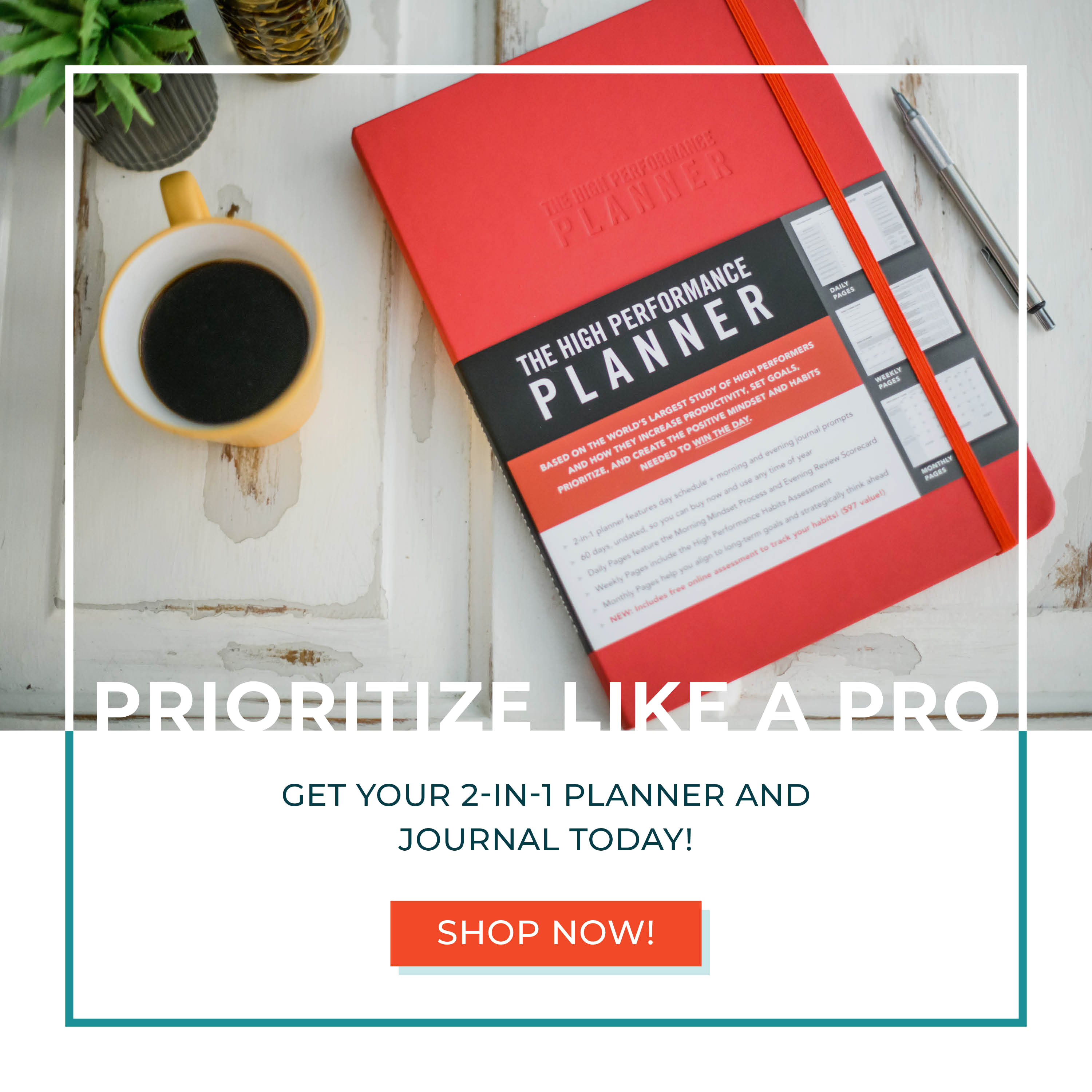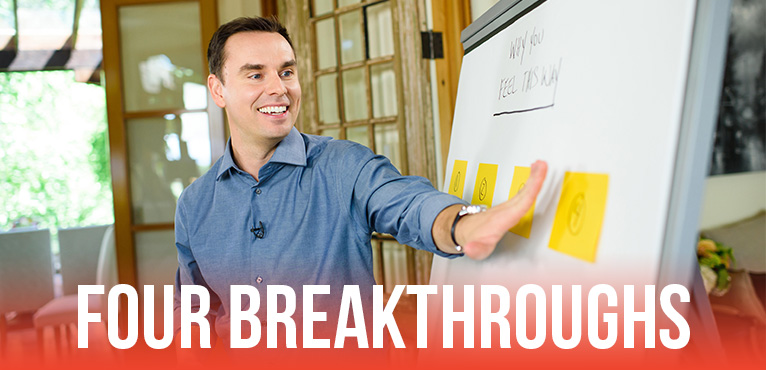SUMMARY
- “If you’re trying to figure out why you’re unhappy, start with the routines you’re continually doing that are negative and stick around because there is a way to get some more happiness back.”
- We know that having healthy habits leads to a fulfilling and abundant life. But what do you do if you have bad habits? In this episode, learn how to start moving away from habits that no longer serve you.
- “We have to practice overcoming a bad habit to be able to do it in real life.”
- If you’re ready to live your life intentionally with habits that take you to the next level of success, this episode is for you!
- Watch the video to get the full training.
- Already have the High Performance Planner and CRUSHING each and every day? Let’s celebrate you! Take a photo with your planner and use #HPXlife or #TeamHPX.
HOT NEWS & DEALS!
-
Join the Entrepreneur’s Challenge!
Sign up for my 7-day crash course and you’ll learn the strategies, tools, and revenue drivers needed to start (or scale) your dream business! Click here to sign up!
-
Get the High Performance System!
If you want to level up personally and professionally, High Performance System is the resource you need. The High Performance System will guide you through developing and implementing the 6 science-backed habits that will move the needle from ordinary to extraordinary. Develop the habits that lead to long-term success, positive relationships, and healthy well-being! Get the High Performance System!
DID YOU KNOW?
I give weekly prizes, gratitude and shout-outs to our students, so post a screenshot or video on Instagram and use #TheBrendonShow! I can’t wait to hear your thoughts about this episode!
RELATED POSTS
How to Track Your Personal Growth
Advice to Human Resource and Learning and Development Leaders
How to Master Motivation
Want Change?Start with Yourself
The Power of Identity
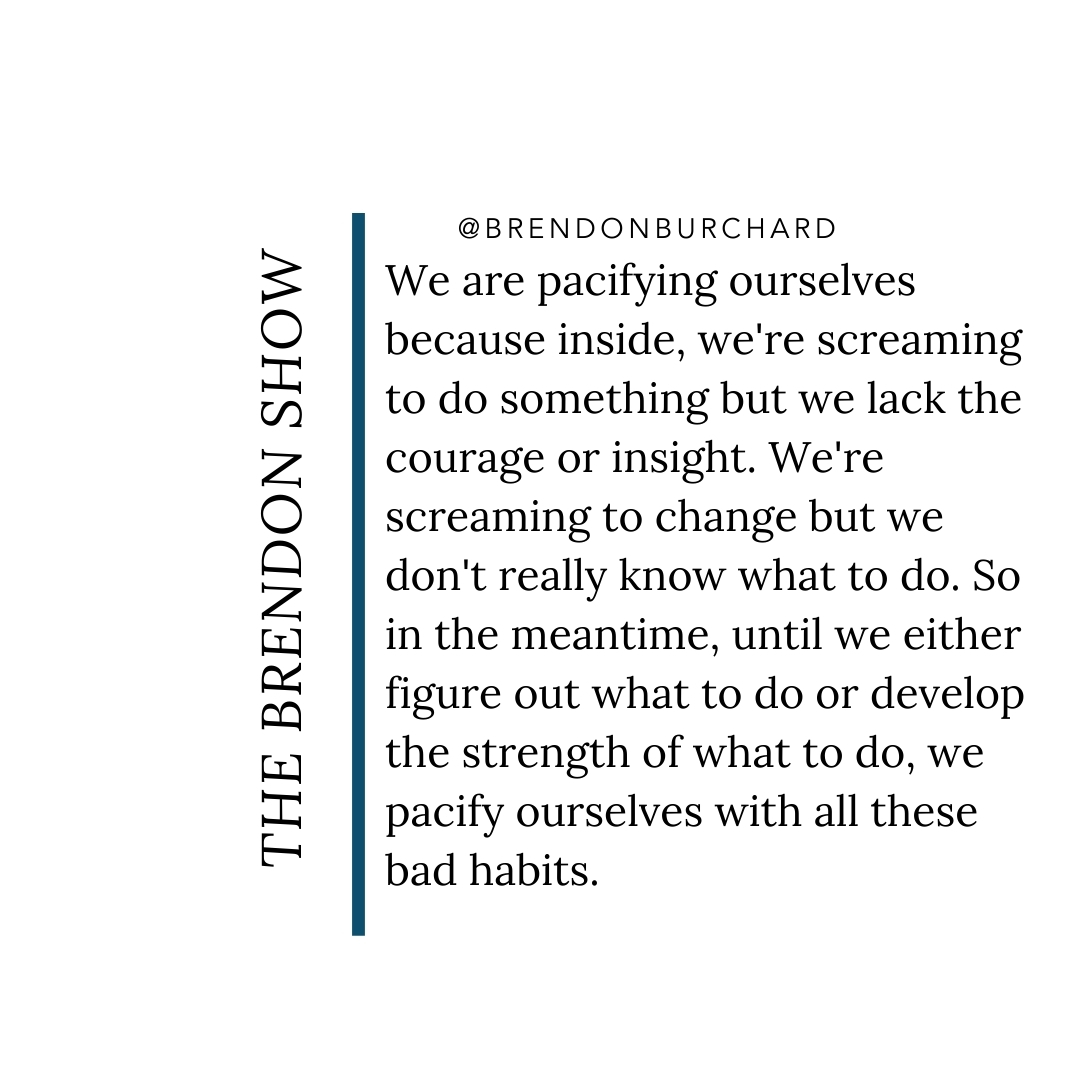
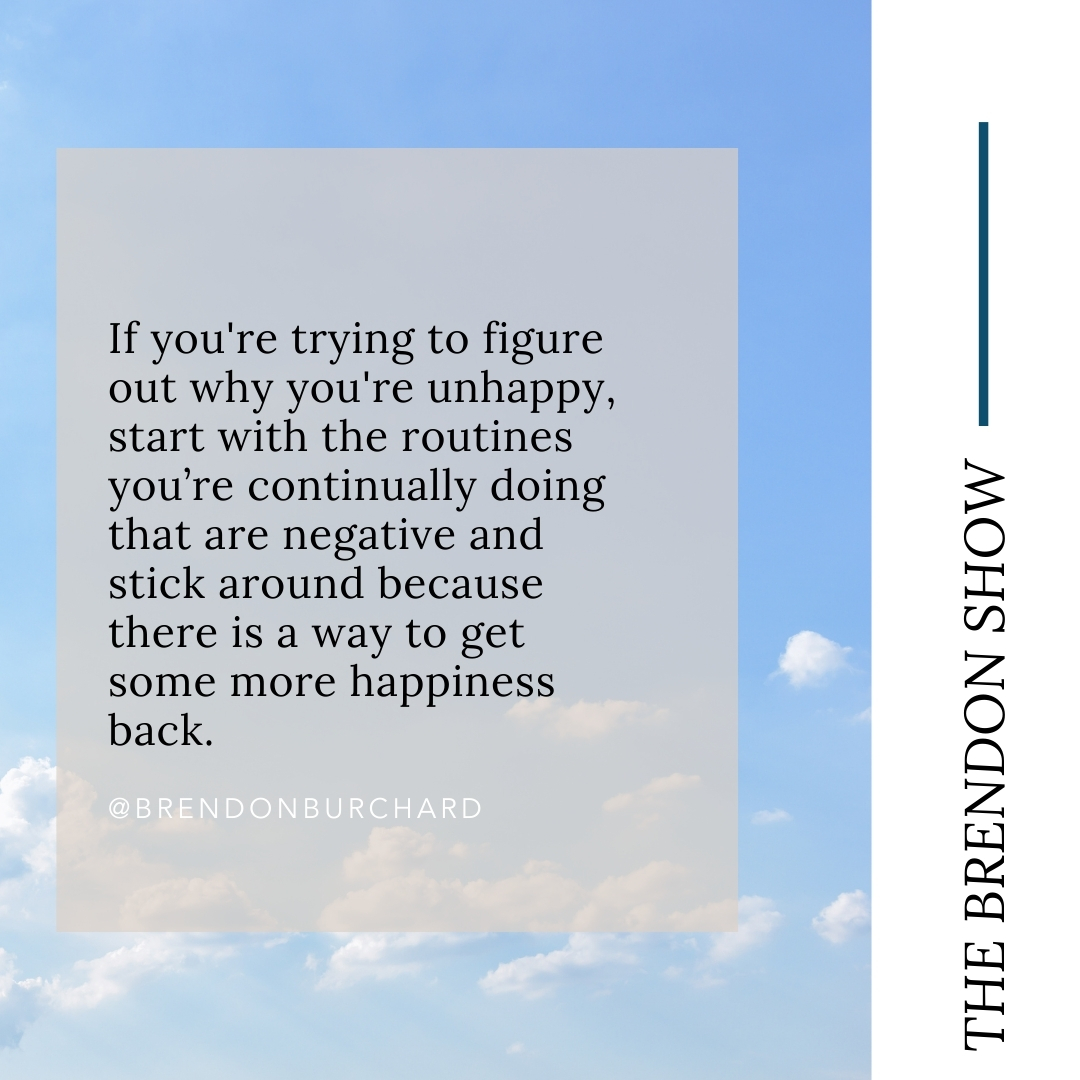
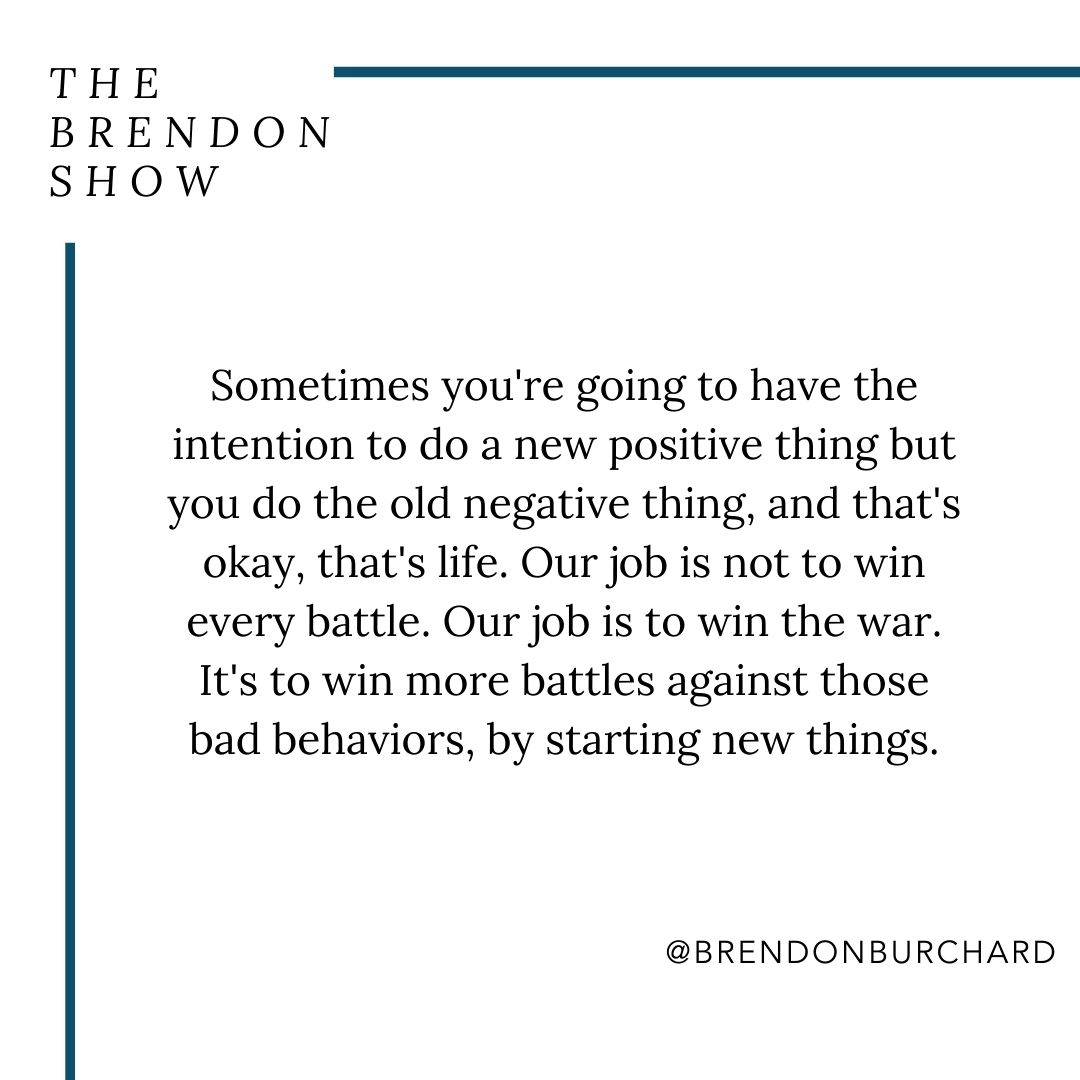
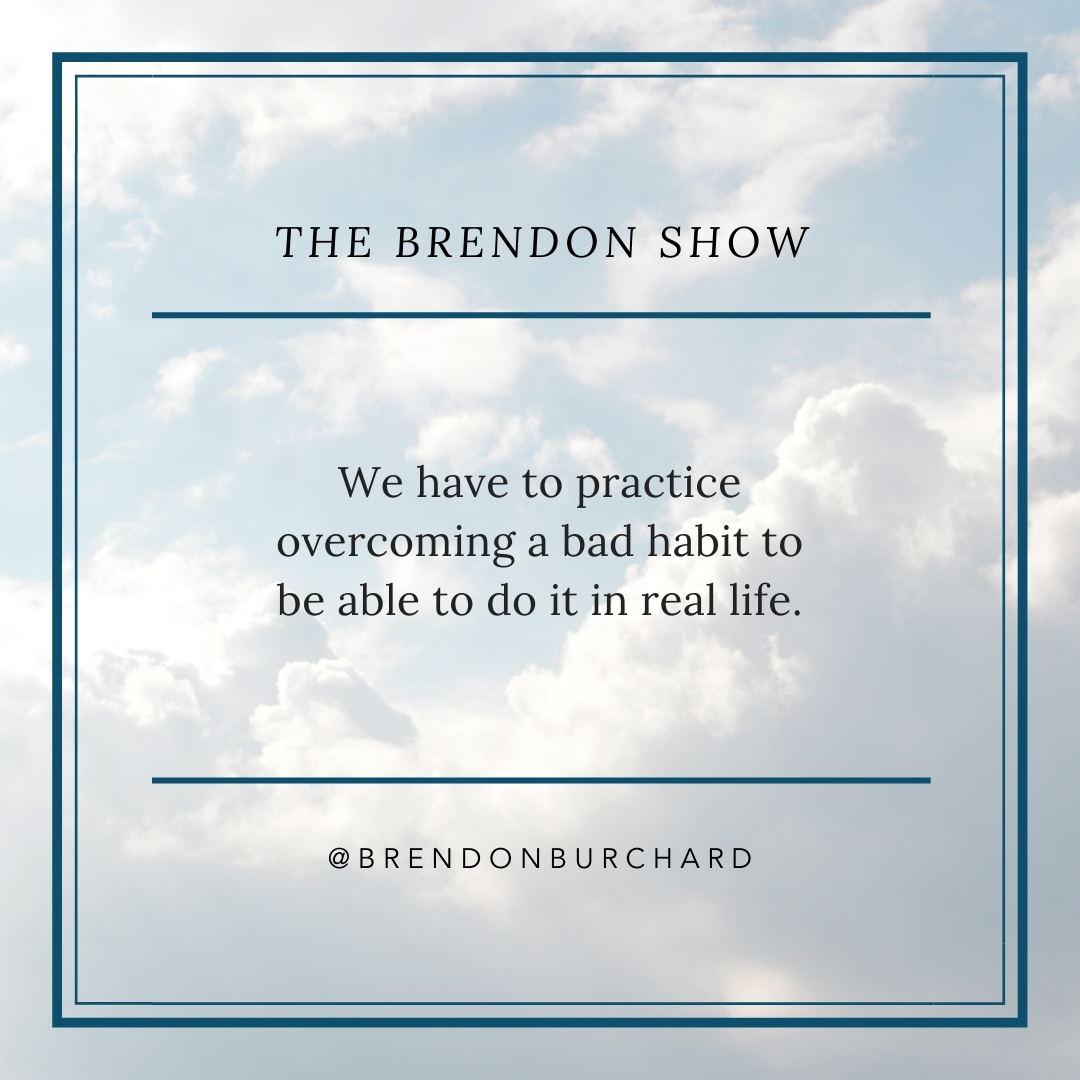
FULL TRANSCRIPT
[The following is the full transcript of this episode of The Brendon Show. Please note that this episode, like all TBS episodes, features Brendon speaking extemporaneously–he is unscripted and unedited. Filmed in one take, The Brendon Show has become one of the most viewed unscripted, direct-to-camera self-help series in the history of YouTube. It has also been the #1 Podcast in all of iTunes and is regularly in the top podcasts in Self-Help and Health categories around the globe. Subscribe to the free motivational podcast on iTunes or Stitcher.)
In this lesson, we’re going to talk about your bad habits. The good news is, anytime I talk about bad habits with people, they already know what theirs are. Maybe your bad habit is you overspend or you overeat, or you’re impatient with people or you’re late for something, or you always let this thing down or that thing fall apart or whatever. We all have bad habits and the good news is, you don’t have to feel bad about them anymore because today we’re going to explain why they happen, and we’re going to explain where they happen, and we’re going to explain one simple thing to overcome those bad habits.
So we’ve got a lot to cover here but I’m going to be very direct and straightforward because I’m going to assume you’re going to do the work of identifying your bad habits. My attempt today is to boil them all down into four categories. So I love just to start by brainstorming any bad habits you have and let’s see if we can pinpoint where they are and why they’re happening.
A bad habit, by definition, is something that’s negative and enduring.
You keep doing it automatically and you’re not even thinking about it. That’s a habit. It’s a response. It’s easy. You just fall right into that thing. So we’ve got to interrupt that bad habit, put something more positive and something more enduring in its place. I’m sure by now you know how habits are formed, right? Something happens, we react to it with a routine and we feel like we’re paid off by it. There’s a payout. There’s a benefit and after a period of time, we just do something over and over and over and over again and it becomes easy or natural: a habit.
But here’s what I discovered about bad habits. There’s really four types or four categories of bad habits. And once we learn to recognize them, awareness is always the first step. So the first step is, let’s recognize where our bad habits are and where they’re coming from. I bet if you looked at all your lists of bad habits that they’ll all fall into these four categories.
1. Our Desire to Protect Ourselves
The first bad habit is bad habits just caused by our desire to protect ourselves. You know, I don’t want to take on that new project and so I have this bad habit of procrastinating because I’m protecting myself. I feel like if I do it, I’m going to lose face. I’m going to fail. Something negative will happen. So I’ve created this little payoff called procrastination. That procrastination is protecting me from falling on my face, from looking dumb, right?
There’s always a payoff to every bad habit and one of them is that payoff of protection. I don’t have to put myself out there, that’s the payoff. I don’t have to get hurt, that’s the payoff. So we create all these habits, whether it’s a habit of perfectionism, where we never actually release anything in the world so we don’t have to be judged. So we think, “How can I protect myself?”, and these bad habits ensue like not completing the work and realize it’s because they might judge me. But there’s a specific thing that’s happening here. We’re looking to protect ourselves. So are there any habits in your life that you’ve developed that’s a bad habit to protect yourself? Let me give you an example.
One bad habit a lot of people have is they don’t speak up for themselves. It’s just automatic. They have an idea in a meeting. They don’t say anything. Someone says something wrong or abusive or mean or negative, they don’t say anything because it’s easier. That habit of not speaking up for ourselves, feels like it’s protecting us. But we call it a bad habit because over time it steals away the joy and charge of life. Is that a category you have going on? Are there any bad habits that you identify, like, “I keep running that same routine to protect myself.”
2. Pacify Our Negative Feelings
The second big habit that we have is to pacify our negative feelings. To pacify ourselves, when we feel stress, overwhelm or even uncertainty of what to do, “I know I’m supposed to be doing something but I don’t know what. So I’m going to pacify myself.” Just like if a child is screaming you give it that pacifier so that it soothes them. Well so we sooth ourselves with food. We sooth ourselves with social media. We sooth ourselves with distractions. We sooth ourselves with meaningless conversations or relationships.
We are pacifying ourselves because inside, we’re screaming to do something but we lack the courage or insight. We’re screaming to change but we don’t really know what to do. So in the meantime, until we either figure out what to do or develop the strength of what to do, we pacify ourselves with all these bad habits.
“Well, I don’t know what to do, or I feel uncertain, so I’m going to eat. I don’t know what to do or I feel uncertain so let me just check in. I’m going to look at the newspapers here. I’m going to look at my phone.” Or we feel uncertain or insecure and so we pacify ourselves by seeking validation from other people. “Could you tell me how great I am?” And we develop all these bad habits of doing things that compromise ourselves just so we can get some validation from some people, because we feel insecure. It’s important to recognize those bad habits that are really just pacifying a deeper need that says, “Do something, try something, go.” It’s so important.
3. Placating/Pleasing Others
The third big category of bad habits comes under placating.
That means we have a bad habit of pleasing other people so that we can cause them less stress, less overwhelm, or get less emotional reaction from them. Like a lot of people, they would call themselves—they say, “You know, Brendon, I’m kind of a doormat.” I said, “What do you mean you’re a doormat?” “Well, you know, I don’t want to cause a ruckus and I just let people run over me all the time.” You know, people are always stepping all over you and it’s because they have a bad habit of not fighting for what they really want, not communicating clearly their expectations, not setting standards. Instead, they don’t want to upset their husband. So they don’t say anything. It’s not about protection. It’s about placating him sometimes. It’s about placating the people around you to make them feel good even though it’s coming at the cost of your life. That’s often a big, bad habit isn’t it?
That’s why we get overwhelmed in the first place. It’s because we’re doing everything for everybody else to make everybody else feel happy and charmed and good, at the cost of our own sanity, our own wellbeing, our own health.
4. Proving Ourselves
And the last big category, over and over and over, of bad habits is proving ourselves.
Bad habits, if you’re always arguing, you just—someone says something and you just scream at them. You get angry because you have to prove yourself. It’s your ego saying, “Hey, hey, validate me. Hey, pay attention.” Someone cuts you off on the road. You flip them off, you floor it, you cut in front of them. You go, “Hahaha! Look at me, jerk!” You want to prove that you’re important. You want to prove that you should be taken seriously. You want to prove that you’re somebody who doesn’t deserve to be cut off and you fight and you fight and you fight and you fight.
And so, if you can at least begin to identify some of these, maybe just me talking with you here, maybe that helped you identify some habits. And you’re like, “Oh, I’m doing that.” So if all we did is help you generate some more understanding or awareness or categorization of your bad habits, we’re starting on the right foot.
I’ve found over and over in my life, a lot of people don’t know what their bad habits are and yet they’re unhappy.
So if you’re trying to figure out why you’re unhappy, start with the routines you’re continually doing that are negative and stick around because there is a way to get some more happiness back.
It’s right there and all we have to do is make sure first we’re aware of them and then once we’re aware of them, we decide we’re going to break them. We’re going to find a payoff that’s above those payoffs and it’s a very simple thing to do. I’m going to ask you to do one thing and it’s so easy. Whatever your bad habit is, all I want you to do is rehearse overcoming that bad habit. Rehearse it, because see what we think is, that one day we’re just going to break our bad habits and it’s going to be instantaneous and easy.
The thing is we have to practice overcoming a bad habit to be able to do it in real life.
So here’s what I mean. What I’d love you to do, if your bad habit is you just pacify yourself with food when you’re uncomfortable or unsure, what I’d love you to do is not do what everyone else says. Get rid of all that food because all that food and you know, if there’s food around you, you’re just going to be fat, right? It’s like, well, it’s not the food. It’s why you’re turning to the food. So let’s not try and solve the—leave the food, and let’s practice not going to the food. Let’s instead rehearse, “Okay, how do I deal with this emotion instead of going to the food? What’s another way I can have the payoff of dealing with the emotion without that thing that’s the bad habit?” The food, as an example. Now what I want you to do is don’t wait until next time you’re angry or hurt or upset to go to the food, instead, stand there looking at the food say, “Okay, when was the last time I was really angry, upset, emotional, unsure, insecure and I went to that bag of potato chips? When was that? Okay, let me remember that. What was that like? Now let me rehearse, not going to the food. What else could I do? What routine or behavior could I do instead of going to the food? Okay, you know what I’m going to do? I’m going to open up my journal right next to that dang bag of chips. I’m going to open up that journal and I’m going to look at the chips. I’m going to open the journal, not the chips. Open journal not chips, open journal not chips, open journal, not chips. And I’m going to write down, “Why am I upset? If my highest self was in this situation right now, what would he or she do?”
Let me ask you that question again. If my highest self was in this situation right now, what would he or she do? And I want you to literally write that out. So what happens with habits is there’s a cue. Something negative happens. Our response or our routine is also negative, but it feels like it’s paying us off and then we feel horrible for ourselves. So that middle thing, here’s what you do. The cue still happens. The cues, my friends, are always going to happen. If stress or drama from another person drives you in a bad habit, I’m going to tell you, there’s always going to be stress and drama from other people. If feeling insecure or unsure always drives that bad habit, guess what, there’s always going to be times in your life, you’re going to feel insecure and unsure.
The cues, my friend, are not going to change. They’re always going to be there. So your job is instead of running that routine of that bad habit, is identify what you’re trying to do. “Am I trying to protect myself right now? Am I trying to pacify myself? Am I trying to placate her? Am I trying to prove myself?” And instead just ask the simple question, “What would my highest self do in this situation?”
You’re not going to win every time. You’re just not.
Sometimes you’re going to have the intention to do the new positive thing but you do the old negative thing and I’m here to tell you that’s okay, that’s life. Our job is not to win every battle. Our job is to win the war. It’s to win more battles against those bad behaviors, by putting in new things.
And you know what’s funny, as soon as you put in those new things, guess what they give you? A payoff. When you act as your highest self would in that situation versus going to your protectionist self or your pacifying self or you’re placating self or that part of you that just feels like you got to prove yourself, you go to a higher realm, your brain gets the payoff. Your brain says, “Good job, good job, good job, good job.” And the more good habits you run, the more your brain says, “Good job man, good job man.” And now you have more strength. You have more certainty in yourself. You don’t have to lean like a crutch on those bad behaviors to give you some sort of weak payoff. Instead, your brain goes, “Hey, you know what? Last time we fought this and we won. That felt pretty good.”
And you start to get momentum, establishing new, good, positive habits simply because you said, “Bad cue, what good would my highest self do?” You try that a few times and you start getting momentum to change your life.
